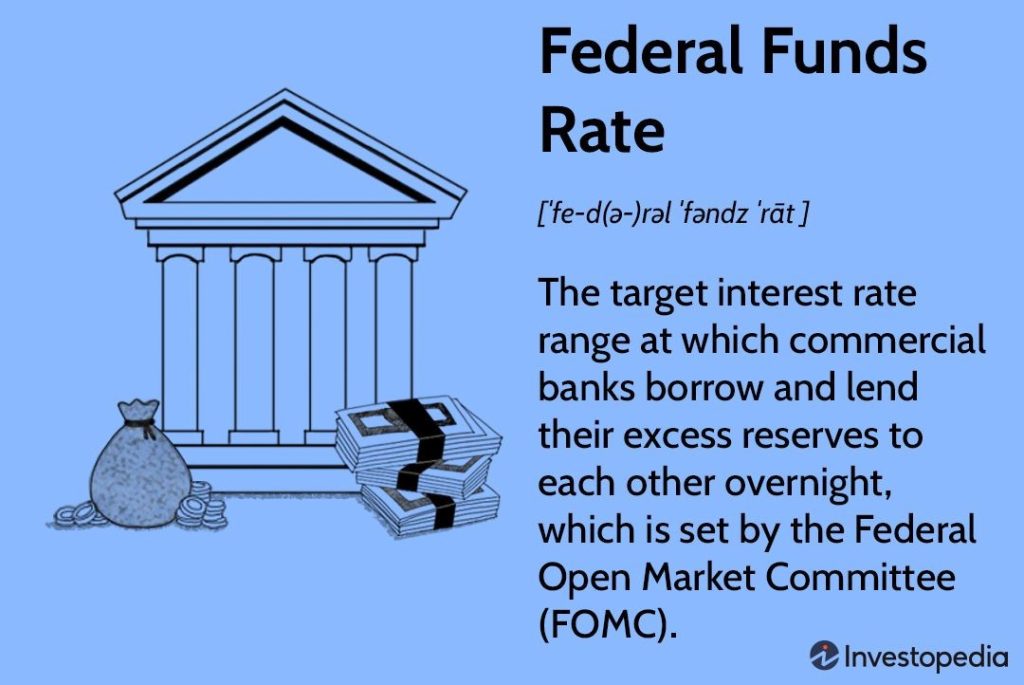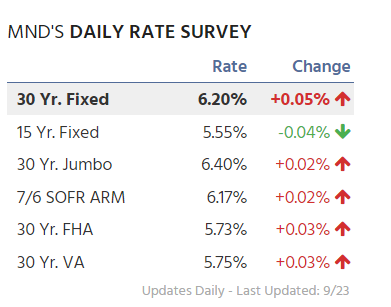VIDEO UPDATE: Interest Rates Improve Despite Higher Inflation, Here is Your Weekly Mortgage Rate Update…
🎉 The Fed Finally Lowers Rates – Here’s What It Means for You!
VIDEO UPDATE:
The FED Finally Lowers Interest Rates. Here is Your Weekly Mortgage Interest Rate Update! (youtube.com)
TODAY’S RATES & HOUSING NEWS:
The FED finally does it!
After over 4.5 years, the FED
lowered the Federal Funds Rate
50 bps on September 18th. The
FED also predicted that they would
lower the Federal Funds Rate another
50 bps through 2024, and another
100 bps through 2025.
Here is a brief history of the recent
Federal Funds rate rise.
Inflation started skyrocketing in 2022
and the FED combatted that by
raising the Federal Funds Rate
to try and tame inflation. By
increasing the cost to borrow, it
is less likely people would purchase
as much. Lower demand helps keep
prices stable.
So what does the FED lowering the
Federal Funds Rate mean for you?
The Federal Funds rate is the overnight
banking rate that banks lend to one
another. The Federal funds rate has a
direct impact on short term rates such as:
Credit Cards
Car Loans
Personal and Business Loan
And Short-Term Treasuries
While the Federal Funds Rate can
impact mortgage rates over time, it is
not directly tied to mortgage rates.
Mortgage rates are more closely tied
to inflation.
As inflation comes down, mortgage rates
typically follow. As inflation rises,
mortgage rates typically rise.
The FED lowering the Federal Funds
Rate can actually increase inflation as
it allows people to borrow and spend
more. The theory is that the FED has
been restrictive on short term rates for
so long, that lowering the Federal
Funds Rate and Short Term Rates
shouldn’t impact inflation and cause
it to rise. This is the so called
“soft landing” the FED was looking
to achieve.
You can see this indirect correlation
with what happened to mortgage rates
this week. The market predicted that
the FED would lower the Federal Funds
Rate by at least 25 bps for 2 months.
When the FED finally did lower the
Federal Funds Rate on Wednesday –
mortgage interest rates did a peculiar
thing. Mortgage Rates actually went up.
Mortgage Rates went up approximately
.1% over the past 7 days with the
Mortgage Backed Security (MBS) market
trading down -20 bps.
I believe that the FED lowering the
Federal Funds Rate over time will
help lower mortgage rates over time.
This typically takes much longer than
we expect and doesn’t happen in a
straight line – meaning rates will go
down and up, but more movement
down over time causes interest rates
to slowly decline.
I’ll break down how I would look at
interest rates and buying and refinance
decisions below.
Below are Mortgage News Daily’s
average interest rates across the
country. There are a lot of characteristics
that go into a mortgage rate – credit
score, investor, loan to value, loan
amount, costs, etc.
Please call me to go over your specific
scenario so we can price your loan
out accurately.
OR reply to this email with the answers
to the questions below for Mortgage
Options for your scenario.
REFINANCE QUOTE:
Goal of Refinance – Lower Payment, Cash Out, Etc:
Address of Home:
Estimated Value Of Home:
Current Loan Amount:
Loan Amount You Would Like to Finance:
Current Rate:
Do you know what type of Loan you are Currently in – FHA, VA, etc:
Estimated Credit Score:
Are You a Veteran or Active Member of the US Military:
If you are a Veteran, do you get VA Disability:
PURCHASE QUOTE:
What City and State Are You Looking to Buy In:
Estimated Purchase Price:
Loan Amount You Would Like to Finance:
Will Property be a Primary Residence, Investment Property, or Vacation Home:
Estimated Credit Score:
Are You a Veteran or Active Member of the US Military:
If you are a Veteran, do you get VA Disability:
Thank you!
SHOULD I WAIT FOR RATES TO DROP?
This is a very common question we
get, especially when rates are
expected to move lower. If rates are
going to move lower, why would I
refinance now or purchase today
when I could just wait until rates
are lower.
Here is a breakdown of the potential
benefits and drawbacks of waiting.
Let’s start with Refinancing.
REFINANCE – SHOULD I
REFINANCE OR WAIT?
If you refinance today and rates
continue to move lower, you could
decide to refinance again which could
equate to you paying refinance fees
more than once and going through a
loan process more than once.
The benefits of waiting could be:
* As rate falls you will save more
money on your rate and payment.
*Waiting could cost you less in fees
by eliminating multiple refinances
*Could save you time by not going through
the loan process more than once
The drawbacks of waiting could be:
*Paying a higher interest rate and payment
today while you are waiting for more
savings in the future
*There is absolutely no guarantee that rates
will continue to drop and you could lose an
opportunity to save money
*Rates typically take longer to drop than
people realize, thus costing you money
while you wait
Here is my recommendation when refinancing:
If you can save a good amount of interest
and lower your payment a good amount
today (that is different for people based
on their income and budget) and you can
recoup your costs in less than 2 years,
I would consider refinancing.
For example, let’s say I can save $150 per
month and it costs me $3,500 in costs to do it.
(DO NOT INCLUDE PREPAID INTEREST
AND ESCROW IMPOUNDS IN COSTS AS
THEY ARE NOT REAL COSTS)
$3,500 divided by $150 =
23.33 month recoup period.
I would likely do that because the
recoup period is less than 2 years
and I know there is no guarantee
interest rates will fall or how fast
they will fall.
Let’s say I do the deal above, but
I end up refinancing again in one year.
I save $150 x 12 = $1,800. The
original loan cost me $3,500, so
I lost $1,700. To me that $1,700
loss was worth me potentially losing
$150 per month for the length of my loan.
You have to make your own judgement
call on what’s most important to you.
Saving money today or waiting to save
more money tomorrow without a
guarantee that you can save more money.
HOME PURCHASE – SHOULD
I PURCHASE OR WAIT
If you purchase today and rates continue
to move lower, you could decide to
refinance in the future which could
equate to you paying loan fees more
than once and going through a loan
process more than once. But, if rates
drop, this usually creates more housing
demand which leads to higher home prices.
The benefits of waiting would be
close to the same:
*As rate falls you will secure a home
with a more affordable rate and payment
*Waiting could cost you less in fees by
eliminating multiple home loans
*Could save you time by not going through
the loan process more than once
The drawbacks of waiting are quite different:
*If rates drop significantly, home
prices will likely rise
*A rise in home prices will increase
your down payment requirement
*Despite a lower rate, your payment could be
higher because the purchase price and loan
amount are higher.
Let’s do a simple example.
Let’s say I have the opportunity
to purchase a $400,000 home today.
I buy a $400,000 home today putting
20% down and finance the rate at 6.25%.
This would look like this:
$1,970.30 Principal and Interest Payment
$320,000 Loan Amount
$80,000 Down Payment + Costs and Prepaids
Let’s compare this to waiting a year and
purchasing a home at 5.75%.
If the home appreciates at 5%, purchase
price in a year would be $420,000.
This would look like this:
$1,960.80 Principal and Interest Payment
$336,000 Loan Amount
$84,000 Down Payment + Costs and Prepaids
So, in the above example, you save
$10 per month in the monthly payment
by waiting one year, but you pay a
higher purchase price of $20,000.
You would not make up that $20,000 in
your monthly cash flow during the full
life span of a 30-year mortgage.
Again, this is a personal decision
for you but if I know I’m going to
purchase a primary residence, I
would rather purchase now because
I can secure the home at today’s
prices and refinance in the future if
rates drop to lower my rate and payment.
Have a great week!






